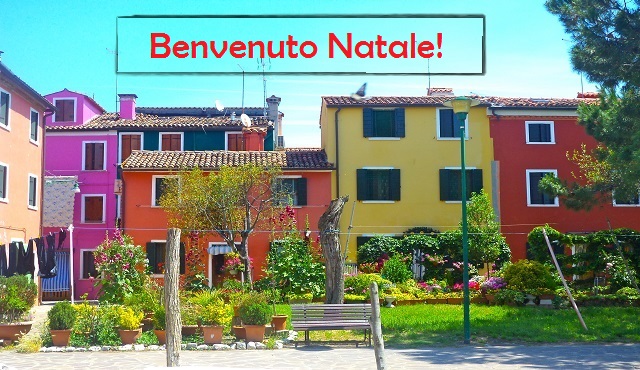How to Use Benvenuto! and Italian Holiday Party Conversation
“Benvenuto!”* and its variations (Benvenuti! Benvenuta! and Benvenute!) are frequently used Italian interjections that all mean “Welcome!” Guests (gli ospiti) to an Italian household can expect to hear these words as a warm greeting before crossing the threshold into the home (casa) of the host or hosts (la padrona di casa/il padrone di casa or gli ospiti).**
Whether family, friend or acquaintance, every guest will be greeted warmly as a sign of the Italian dedication to hospitality for all. And, of course, the Italian Christmas season, which starts in early December and lasts until early January, brings with it many occasions for get-togethers with family and friends. For those interested in reading more about how the Christmas season is observed in Italy, click on the link to our previous blog What I Wish… for the Holidays!
Let’s get started learning some useful conversational expressions for Italian holiday gatherings from the very beginning — by first focusing on how to use the Italian interjection “Benvenuto!” to greet others.
There is only one rule to know regarding interjections: the ending of the interjection must agree with the gender and number of the noun (person, place or thing) that the interjection describes. Therefore, when the speaker addresses another person, the interjection must refer to the gender and number of the person or people who are being addressed. This, in turn, will determine the ending of the interjection!
Sound complicated? Well, it is… a little bit. By remembering which form of benvenuto to use in four different situations, you will automatically have committed the rules for other Italian interjections to memory!
*Benvenuto can also be used as a noun and adjective as well, in these cases without the exclamation point, but with the same meaning of “welcome.”
**Notice that the same Italian name is given to both guests and hosts: gli ospiti.
La padrona di casa refers to the woman of the house, or as we say in English, the hostess.
Il padrone di casa refers to the man of the house, or the host.
Interestingly, the English word “hostess” means “stewardess” in Italian and has no other meaning in Italian. “L’hostess” means “the stewardess.”
How to Change Benvenuto
from Singular to Plural
In general, of course:
- A masculine Italian noun and its adjective will end in -o, and this ending will change to -i in the plural.
- A feminine Italian noun and its adjective will ends in -a, and this ending will change to -e in the plural.
- An Italian noun or adjective that ends in -e may be masculine or feminine, and this ending will change to -i in the plural.
If you are interested in learning more about masculine and feminine words in Italian that end in the letter -e, and how to distinguish one from the other, this You Tube Video may be of help: Italian Grammar by Stella Lucente.
For our interjection Benvenuto! the following rules apply:
- The singular masculine form is benvenuto.
The plural masculine form (for a group of males or a group of males and females) is benvenuti. - The singular feminine form is benvenuta.
The plural feminine form (for a group of females) is benvenute.
Therefore, if greeting one male person, you would say, “Benvenuto!” If greeting a group of males or a mixed group of males and females, you would say “Benvenuti!”
What should you say if one of your female relatives or or a female friend is at your doorway? “Benvenuta!” of course. And if she brings her female friends or mother, daughter, or female cousin? Say, “Benvenute!”
Changing the Italian Interjections
Bravo! and Beato!
As a visit to the symphony, ballet, or opera is often a part of the Christmas holiday season in Italy and America, let’s apply what we’ve just learned about the interjection “Benvenuto!” to the frequently used interjection “Bravo!”
If we follow the rules in the last section for masculine and feminine endings, we should cheer “Bravo!” when one talented male Italian singer steps in front of the stage curtain for applause. And we do hear this word “Bravo!” frequently in America for a performance well done. But, in proper Italian, we should also be cheering “Brava!” for the female diva of the performance, and “Bravi!” for the entire fabulous ensemble.
In general, any person, male or female, who is “good” at something, or has done “a good job” is a “brava persona.” In this case, the noun persona is feminine and so the adjective that modifies this noun must be feminine as well!
One more example of a commonly used interjection is “Lucky you!” Has your brother received an unexpected holiday gift from a friend? If so, and if you would like to express your happiness for him, you could say,“Beato te!” Your sister? “Beata te!” An acquaintance? Either “Beato Lei!” for a male acquaintance or “Beata Lei!” for a female acquaintance, of course!
If your parents were finally able to retire and plan their dream vacation to Italy, you might comment, “Beati voi!” for “How lucky you all are! And if your sisters are able to take a vacation together after an unexpected windfall — Beate voi!”
The table below summarizes these three common Italian interjections. There are many more. How many more can you think of?
| Benvenuto! | Welcome! (to a male) |
| Benvenuti! | Welcome! (to a group of males or a group of males+females) |
| Benvenuta! | Welcome! (to a female) |
| Benvenute! | Welcome! (to a group of females) |
| Bravo! | Well done! (to a male) |
| Bravi! | Well done! (to a group of males or a group of males+females) |
| Brava! | Well done! (to a female) |
| Brave! | Well done! (to a group of females) |
| Beato te! | Lucky you! (to male) (familiar singular you) |
| Beato Lei! | Lucky you! (to male) (polite singular you) |
| Beati voi! | Lucky you! (to a group of males or a group of males+females) (polite plural you) |
| Beata te! | Lucky you! (to female) (familiar singular you) |
| Beata Lei! | Lucky you! (to female) (polite singular you) |
| Beate voi! | Lucky you! (to a group of females) (polite plural you) |
Benvenuto Natale!
Now that we understand how Italian endings change for Italian interjections — that is, that the endings must agree with the gender and number of the person or people who are being addressed — we can continue with some useful phrases for conversation at a holiday party.
In the following table:
- Some of the phrases will have nouns or adjectives with endings that change depending on whom is speaking or on whom is being addressed.
- Verb endings will change, as usual, with the choice of polite or familiar address, and abbreviations pol. and fam. will be given in each case.
- Command verb forms are often used, as denoted.
- Subject pronouns will also change, of course, and when attached to the infinitive form of the verb are given in red.
- When Italian subject pronouns are not given, but must be used in the English translation, they are written with parenthesis in English.
Upon entering someone’s home as a guest, you may hear these phrases and respond accordingly:
| Benvenuto!(a)(i,e) | Welcome! (to male/female, singular and plural) |
| Entri! Entra! |
Come in! (pol./fam. command verb) |
| Si accomodi. Accomodati! |
Make yourself comfortable. (pol./fam. command verb) |
| Da questa parte, prego. | This way, please. |
| Si sieda. Siediti! |
Sit down. (pol./fam. command verb) |
| Piacere di conoscerla. Piacere di conoscerti. |
Pleased to meet you. (pol./fam.) |
| Piacere mio. | The pleasure is mine. |
| Lieto(a) di conoscerla. Lieto(a) di conoscerti. |
Delighted (masc./fem. speaker) to meet you (pol./fam.) |
| Molto lieto(a)! | Delighted! (masc./fem. speaker) |
| Sono molto contento(a) di vederla. Sono molto contento(a) di vederti. |
(I) am very happy (masc./fem.) to see you. (pol./fam.) |
| Sono felice di riverderla. Sono felice di rivederti. |
(I) am happy to see you (pol./fam.) again. |
Some useful phrases of response during a conversation at a party:
| Non mi dica! | You (pol.) don’t say! (lit. You are not telling me!) |
| Sono contento(a) per lei. Sono molto contento(a) per te. |
(I) am happy (masc./fem. speaker) for you .(pol./fam.) |
| Mi piace molto! Mi piace tanto! |
I love it!/ I like it a lot! (lit. It is very pleasing to me!) |
| Mi piace un sacco. | I love it! (idiomatic expression) (lit. It is pleasing to me a sac full.) |
Upon leaving someone’s home after a gathering, you may express the need to leave and your thanks for a lovely evening using these phrases:
| Devo andare via ora. | (I) must leave now. |
| È stato un piacere. | (It) has been a pleasure. |
| È stato divertente. | (It) has been enjoyable/fun/a blast/amusing/funny. |
| Ti sei divertito(a)? | (Did) you (fam.) enjoy yourself? (masc./fem.) |
| Mi sono proprio divertito(a). | (I) really enjoyed myself. (masc./fem. speaker). (I had a great time.) |
| Grazie di tutto. | Thank you for everything. |
| Grazie per la Sua ospitalità. Grazie per la tua ospitalità. |
Thank you for your (pol./fam.) hospitality. |
| Grazie per una bella serata. | Thank you for a nice/beautiful evening. |
| La ringrazio. Ti ringrazio. |
(I) thank you. (pol./fam.) |
Remember how to use the interjection Benvenuto! and I guarantee you will be able to easily add many more interjections to your daily Italian conversations!
Auguri di Buon Natale!
 Fra Noi Embrace Your Inner Italian
Fra Noi Embrace Your Inner Italian






